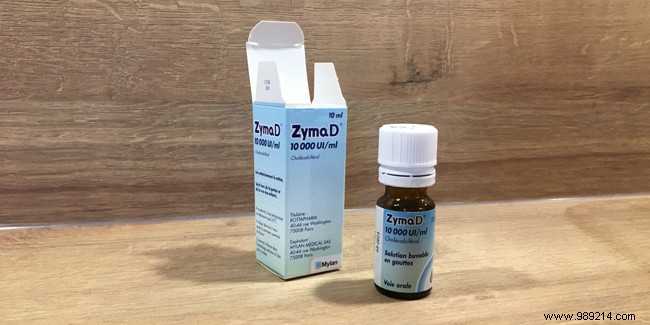
Vitamin D has been talked about a lot about its role against Covid-19, including by medical experts who even went so far as to sign a column inviting general practitioners to prescribe vitamin D for the purpose of prevention, on the one hand , and on the other hand, in order to limit an evolution towards serious forms in people whose test would have proved positive. Should we therefore see vitamin D as a preventive treatment?
Vitamin D is a hormone that our body synthesizes by exposing our skin to ultraviolet rays from the sun. After passing through the liver and then the kidneys, it takes on its active form which interests us (calcitriol). Food also provides vitamin D.
It allows good calcification, therefore a more solid bone material, which is particularly interesting in growing children as well as in seniors subject to osteoporosis and in whom fractures are more troublesome due to increased fragility of the bones. bone leading to longer rehabilitation and a risk of loss of autonomy.
Vitamin D also stimulates the immune system and makes it more resistant to viral infections as recalled by the WHO:"Vitamin D is thought to play an important role in the regulation of the immune system, and can potentially protect infections. Its supplementation may reduce the incidence and deleterious effects of these conditions ".
ANSES (National Agency for Food, Environmental and Occupational Health and Safety) warned in April 2020 of "the importance of ensuring an adequate intake (of vitamin D), especially for people elderly, people with dull or even dark skin and postmenopausal women ".
In winter, the sun is rarer, which means that in spring, almost the entire population is more or less deficient in vitamin D. In France, 80% to 90% of the elderly are deficient in vitamin D, due to a more difficult synthesis of vitamin D, sedentary lifestyle, lack of outdoor activities and often poor nutrition.
Still according to ANSES, which was concerned, during confinement, about the risk of vitamin D deficiency, it would be enough to plan a break of 15 minutes a day by exposing your face, hands and forearms to the rays of the sun, "to meet the needs of an adult in good health".
For the elderly in whom the synthesis of vitamin D is less well done by sun exposure, it is necessary to prepare their menus by including as much as possible foods rich in vitamin D3 (Cholecalciferol, of animal origin), among which (source Anses):
Vitamin D2 (Ergocalciferol), of plant origin (lichens, certain mushrooms such as chanterelles, morels, ceps, etc.) is found in very small quantities in foods.
Faced with this list, vegetarians and vegans seem very annoyed. Also, to avoid deficiencies, their doctor often prescribes vitamin D, sometimes after a blood test for vitamin D (Ergocalciferol + Cholecalciferol).
The forms vary – capsules, drops, ampoules – with always the same active ingredients, Cholecalciferol (vitamin D3) overwhelmingly and, especially for vegans, Ergocalciferol (vitamin D2). Daily intake of drops seems to be preferable to stabilize the rate in the blood, while the winter and spring bulb would tend to create peaks and the capsules would be less well assimilated. Without a medical prescription, it is possible to buy vitamin D food supplements, in drugstores or organic stores for example, but it is better to have a medical follow-up.
If the prescription is preferable, it is a question of avoiding the risks of overdose causing too high a level of calcium in the blood, what is medically called hypercalcemia, the consequences of which are the calcification of tissues, cardiological risks and kidneys. They are not frequent but they even exist in a less serious form (nausea, headaches, fatigue, etc.).
The European Food Agency (EFSA) and ANSES recommend a daily intake of vitamin D of 15 µg (600 IU) up to the age of 70, and beyond 70 years of 20 µg (800 IU). It may therefore be useful to take vitamin D supplementation as you age, but without associating it with a protective role such as a vaccine will. Vitamin D, by strengthening the immune system, therefore seems to have a protective role against severe forms of Covid-19:elderly people deficient in vitamin D are necessarily more fragile and therefore more likely to die of Covid-19 due to the syndrome of acute respiratory distress, if they also suffer from other pathologies, creating comorbidities.
According to the same principle of modulation of the immune system, vitamin D could have beneficial actions in people contracting the flu or suffering from high blood pressure, cardiovascular disease, or even cancer.
If the correlation exists between vitamin D in sufficient quantity and less serious forms of covid-19, the outcome of scientific studies with ongoing clinical trials is still lacking.